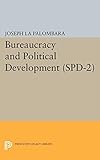Bureaucracy and Political Development. (SPD-2), Volume 2 / ed. by Joseph La Palombara.
Material type: TextSeries: Studies in Political Development ; 1902Publisher: Princeton, NJ : Princeton University Press, [2015]Copyright date: ©1963Description: 1 online resource (528 p.)Content type:
TextSeries: Studies in Political Development ; 1902Publisher: Princeton, NJ : Princeton University Press, [2015]Copyright date: ©1963Description: 1 online resource (528 p.)Content type: - 9780691622934
- 9781400875191
- 351.1
- JF1351 .L12 1967eb
- online - DeGruyter
- Issued also in print.
| Item type | Current library | Call number | URL | Status | Notes | Barcode | |
|---|---|---|---|---|---|---|---|
 eBook
eBook
|
Biblioteca "Angelicum" Pont. Univ. S.Tommaso d'Aquino Nuvola online | online - DeGruyter (Browse shelf(Opens below)) | Online access | Not for loan (Accesso limitato) | Accesso per gli utenti autorizzati / Access for authorized users | (dgr)9781400875191 |
Browsing Biblioteca "Angelicum" Pont. Univ. S.Tommaso d'Aquino shelves, Shelving location: Nuvola online Close shelf browser (Hides shelf browser)

|

|

|

|

|

|

|
||
| online - DeGruyter Light from the Ancient Past, Vol. 1 : The Archaeological Background of the Hebrew-Christian Religion / | online - DeGruyter The Antislavery Vanguard : New Essays on the Abolitionists / | online - DeGruyter As Unions Mature : An Analysis of the Evolution of American Unionism / | online - DeGruyter Bureaucracy and Political Development. (SPD-2), Volume 2 / | online - DeGruyter Change, Hope and the Bomb / | online - DeGruyter Communications and Political Development. (SPD-1) / | online - DeGruyter Conflict and Decision-Making in Soviet Russia : A Case Study of Agricultural Policy, 1953-1963 / |
Frontmatter -- Foreword -- Preface and Acknowledgments -- Contents -- 1. An Overview of Bureaucracy and Political Development -- 2. Bureaucracy and Political Development: Notes, Queries, and Dilemmas -- 3. The Higher Civil Service as an Action Group in Western Political Development -- 4. Bureaucracy and Political Development -- 5. Bureaucrats and Political Development: A Paradoxical View -- 6. Levels of Economic Performance and Bureaucratic Structures -- 7. Bureaucracy and Economic Development -- 8. Bureaucracy and Modernization: The Russian and Soviet Case -- 9. Bureaucracy and Political Development in Eastern Europe -- 10. Bureaucracy and Political Development, with Particular Reference to Nigeria -- 11. The Bureaucracy and Political Development in Viet Nam -- 12. Public Bureaucracy and Judiciary in Pakistan -- 13. International Bureaucracies and Political Development -- Contributors -- Bibliography -- Index
restricted access online access with authorization star
http://purl.org/coar/access_right/c_16ec
What is the role of the public bureaucracy in social, economic, and political development? What are the alternatives of development for newly emerging nation-states? How does a bureaucracy satisfy or inhibit the requisites of democratic development? Twelve outstanding scholars-Joseph LaPalombara, Fritz Morstein Marx, S. N. Eisenstadt, Fred W. Riggs, Bert F. Hoselitz, Joseph J. Spengler, Merle Fainsod, Carl Beck, J. Donald Kingsley, John T. Dorsey, Ralph Braibanti, and Walter B. Sharp-approach these questions both by historical analysis (in the U.S. and in a score of countries in Europe, Asia, and Africa), and by empirical field research (in such varied places as Nigeria, Pakistan, and Viet Nam).Originally published in 1963.The Princeton Legacy Library uses the latest print-on-demand technology to again make available previously out-of-print books from the distinguished backlist of Princeton University Press. These editions preserve the original texts of these important books while presenting them in durable paperback and hardcover editions. The goal of the Princeton Legacy Library is to vastly increase access to the rich scholarly heritage found in the thousands of books published by Princeton University Press since its founding in 1905.
Issued also in print.
Mode of access: Internet via World Wide Web.
In English.
Description based on online resource; title from PDF title page (publisher's Web site, viewed 30. Aug 2021)


